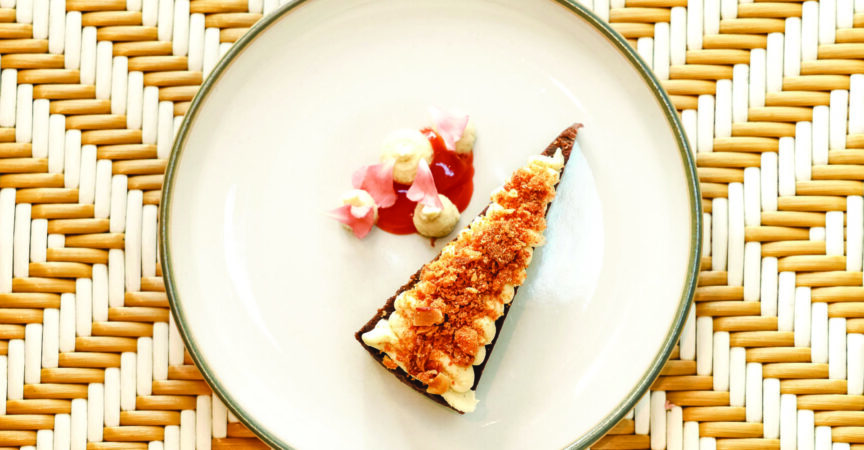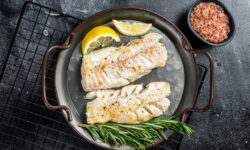The Upsetter
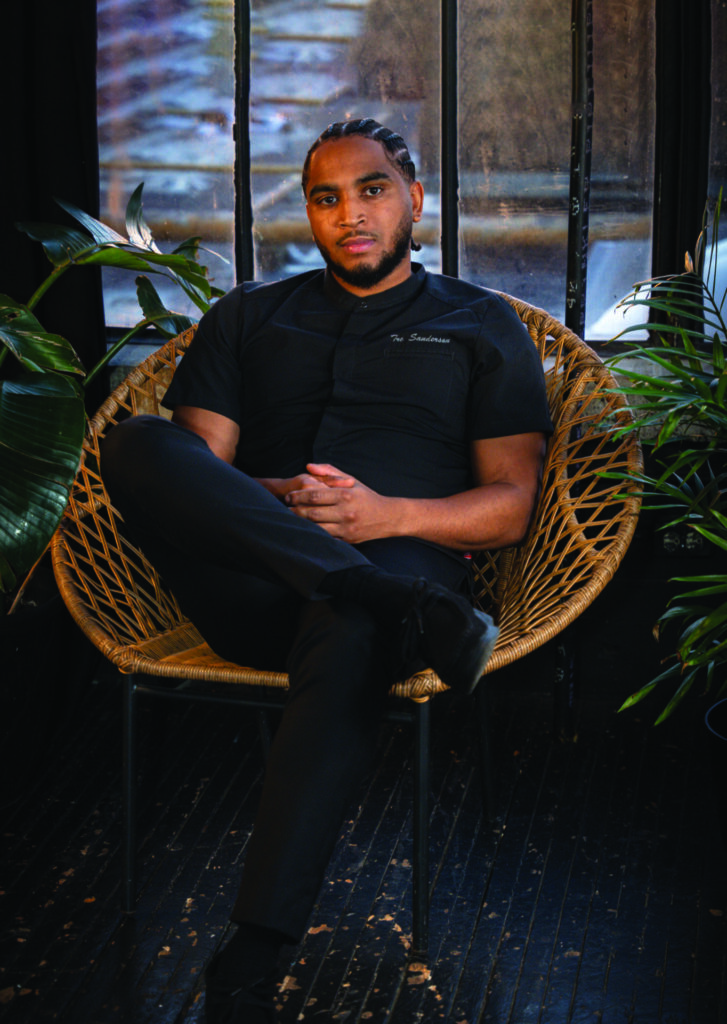
Chef Tre Sanderson still seems a little stunned by his meteoric rise to the top of Canada’s culinary scene. In 2022, he became the first Black chef to win the Food Network Canada’s 10th season Top Chef Canada competition. In just the first half of this year, he’s made the Top 30 under 30 list in Foodservice and Hospitality magazine, took his place on the esteemed judging panel at the Garland Canada Culinary Competition and took home the prestigious Restaurants Canada Culinary Award of Excellence.
On the early days…
I started in this industry in my home kitchen with my mom, watching how she put meals for us together, using certain flavours and different techniques. I was new to it because I was so young, but trying different flavours and seeing everything come together got me really excited. When dinner came around… it was so delicious, and it got me thinking, “Wow…how do you do this? So, I got into it. I wasn’t cooking big meals for my family… I was the youngest of six, so I was the cook-ish.
My mother wasn’t always around to hold my hand while I helped make a meal, so I kind of did my thing in the kitchen and found my way. I made a lot of mistakes, but that was the beginning—just diving into the kitchen and just experimenting with different pantry items I really had no idea how to use. I just put things together and ate and experimented my way to getting better at the craft of Jamaican cuisine as the years went on, because that’s the kind of food we grew up on and the food that I love.
On Jamaican and Caribbean cuisine…
Jamaican cuisine is so unique—the flavour and the process that goes into it. Every ingredient is used in a specific way, and it’s all thought out. It’s technical. It’s delicious. It’s been on the back burner for so long in the culinary world. We don’t really look at Caribbean cuisine as upper-echelon or Michelin-star cuisine. You don’t see those restaurants around the world. But I believe there’s so much flavour, technique and amazing ingredients behind it—it deserves to shine now.
Take curried goat, for example. So many different spices go into this amazing curry…burning the curry off in the oil before that nice meat gets into that nice hot pan with the garlic, the onions and the thyme. I love when that oil gets hot and the curry starts to burn and the aromas fill the air with amazing scents. The process is an ingredient too.
Jamaican and Caribbean dishes are very humble. They don’t take much to curate or make. Dumplings are just water and flour with a bit of salt that get formed and then tossed into a boiling broth, but the little things that sound so simple just come together and it’s so delicious. This cuisine has been passed on from generation to generation, and its future is now.
I really want to try to push Caribbean food to a whole other level and get it into hospitality programs. There’s not a lot of education behind Caribbean or African cuisine. The culinary capitals of the world are mostly very Eurocentric—French, Italian—which are great, but I really want to promote Caribbean cuisine and make people understand how truly amazing it is.
There’s a general lack of understanding, and some difficulty sourcing the ingredients we use. You don’t find a lot of these ingredients in a typical store—you’d have to go to an international market. There is also a lack of amazing, high-end Caribbean restaurants, in Toronto, at least, that are showcasing our amazing flare. I want to open a restaurant where you walk in and you feel like you’ve left your city and arrived on an Island where everything’s so delicious, from mangoes and plantain to breadfruit. These are like iconic ingredients that have been used over decades and generations. There are so many things you could do with these ingredients that are being utilized on the Island and brought here to Canada.
I’m Jamaican. If you look at Jamaican cuisine, you learn that the dishes are not just “dishes”. They have history behind them, and some of them were part of the slave era. A lot of people don’t know that Ackee and Saltfish is the national dish of Jamaica because of the history of slaves, where it was brought on boats from England to the Islands. There’s an educational aspect to the food. Whenever I present a dish, we talk about the ingredients. A lot of ingredients are coming from Africa as well, but also England, because of colonization. There are so many aspects from each of them that come from around the world, but they land there somehow, some way, on these amazing Islands. It’s a beautiful thing. Canada doesn’t really have a national dish. The ingredients are cool, and we have our nice mushrooms that grow in Saskatchewan. We have nice birch syrup that grows up in the Yukon—we have different and unique ingredients. But there are so many cultures in Canada, you can’t really pinpoint a national cuisine.
Being the first Black chef to win—a kind of pioneer—has been big. It’s also pushed the kind of cuisine I’m promoting and helped people understand it a little bit better and respect it more. I don’t want to hold everyone’s hands and be like, “Hey, this is the way”, but I definitely want to inspire and help where I can mentor and really try to be one of the faces of what’s to come.
On Top Chef Canada and the highs and lows of competition…
When it came to throwing down for Top Chef Canada, the biggest thing was seeing that I actually had a chance—I was at a point in my career where I really felt, “My time is now.” I’d been working under chefs for so long, I never had the opportunity to kind of run a restaurant or have my voice on a menu, but I did a lot of my own, best cooking at home. When the time came, I saw it as an opportunity to showcase what Jamaican and Caribbean food is all about. Those who watched the show could see that all my dishes had a Caribbean twist; a different vibe. I wanted to just go hard and really demonstrate that all is possible, on my terms, with this kind of cuisine.
Competing was a really good feeling. It felt like my voice could be heard a little bit louder, and Caribbean cuisine could be part of the future of the culinary world. And, when I had the opportunity to get on the plane as one of the final four, the whole time I was just thinking, “I’m going to an Island… Caribbean flair. There’s no way I can blow this. This is what I’m trying to do. This is what I’m trying to promote. This is the cuisine I know.” I just knew this was an opportunity I could not blow.
Since winning, doors have definitely opened for me, and I’ve been recognized. Being the first Black chef to win—a kind of pioneer—has been big. It’s also pushed the kind of cuisine I’m promoting and helped
people understand it a little bit better and respect it more. I don’t want to hold everyone’s hands and be like, “Hey, this is the way”, but I definitely want to inspire and help where I can mentor and really try to be one of the faces of what’s to come. I don’t want to say I want to take full responsibility, but I feel like I have a little bit of responsibility because it’s a big thing for me and a huge thing for the future.
Before the Garland Canada Culinary Competition at RC Show, I’d never been a judge. I’d never really broken down a dish to say it needed more salt or more acidity. I’d never had to do that to anybody. I must say though, it’s a very humbling experience because I was a competitor not too long ago, and I was a first-time judge. I didn’t really want to be too hard on these competitors because I know how hard it is.
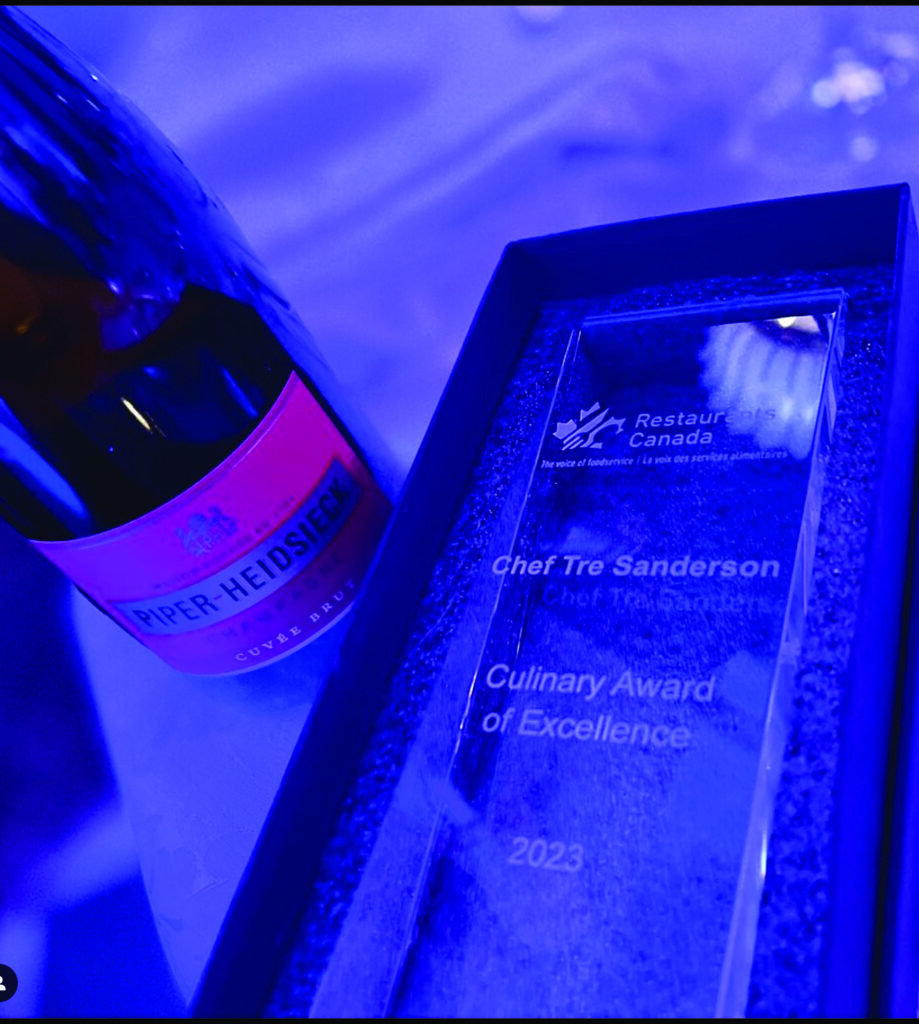
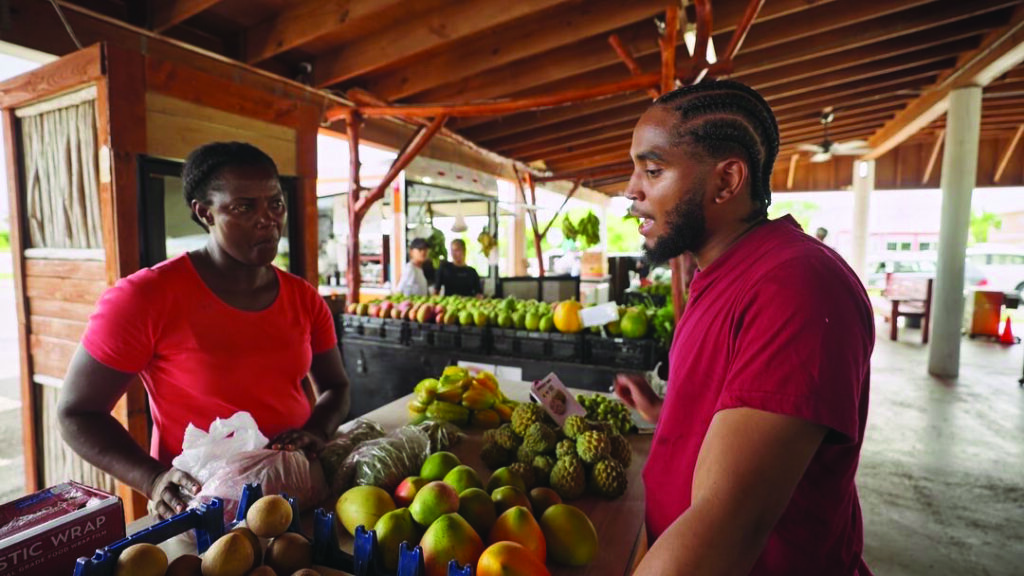
On what’s next…
The Islands are very touristy. People go to Jamaica, they go to St. Lucia and Barbados to visit a place where it’s hot and beautiful. These are destination places where you go to escape reality in some way. I want to do that in a dining context. There are a lot of great little gems in the city, but I feel like it’s so copy-and-paste. People are doing the same thing. Beautiful concepts and beautiful restaurants…but it’s the same food. We all like pasta. I get it. But there’s so much more. I’ve worked alongside some amazing chefs, but I’ve never had the opportunity to bring my vision to light. It’s time for me to do that.
I want my restaurant to feel like you’re on the Island. I want the scent of the ocean in my restaurant because it says a beautiful thing. I want people to feel so relaxed when they come in, that it’s almost like a vacation. The experience, from the service to the food, has to be on point. It’s resort vibes on a whole other level.
Follow Chef Tre Sanderson on Instagram: @tre.sanderson



